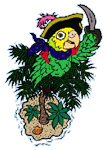 |

|
||||||||||
 |
 |
 |
 |
 |
 |
|
 |
||||
|
Mr. Yuk Says ''NO'' by Dr. Melanie Freeman, DVM
Common Household Poisons of Pet BirdsMany bird owners are unaware of the toxic substances that may exist in their own homes. Lead, smoke, houseplants, chocolate, even carpet fresheners can be toxic to your pet bird. Curious birds readily chew or ingest foreign materials and are very sensitive to airborne toxins and particulate irritants. And, in general, the smaller the bird the more sensitive to toxins it is. Heavy-metal poisoning (lead, zinc, copper, iron) is very common, probably because of their ubiquitous availability (see below) If your bird shows depression, weakness, vomiting, seizures, an inability to use it's legs, diarrhea, bloody urine, or is drinking a lot of water, heavy-metal poisoning should be considered. Any strong odor or smoke is potentially toxic. Gases released from burning non-stick cookware or irons/ironing board covers, self-cleaning ovens, ammonia, strong bleach, glues, paints, nail polish, hair spray, spray starch, moth balls, bug bombs pesticide strips/sprays, carbon monoxide and smoke from any source can result in coughing, wheezing, respiratory failure and death. Even "second-hand" tobacco smoke is believed to result in chronic respiratory disease as well as feather and skin disorders. Aerosolized powdered carpet fresheners have also been associated with death in birds. Avoiding exposure by moving your pet to a distant location or, better yet, out of the house, and providing good ventilation will help prevent toxicities. Many common plants, such as philodendron, rhododendron, oleander and even avocado can be toxic. Vomiting, sores in the mouth and lethargy may result. Many more potential toxins lurk in even the most careful of households. If toxin exposure is suspected, contact your veterinarian immediately. Sources of
Lead: Sources of
Zinc: Miscellaneous
Toxins: Additional Safety articles:
|
Copyright
© 2000-2003 Parrot Island, Inc.
Send mail to webmaster with
questions or comments about this web site.